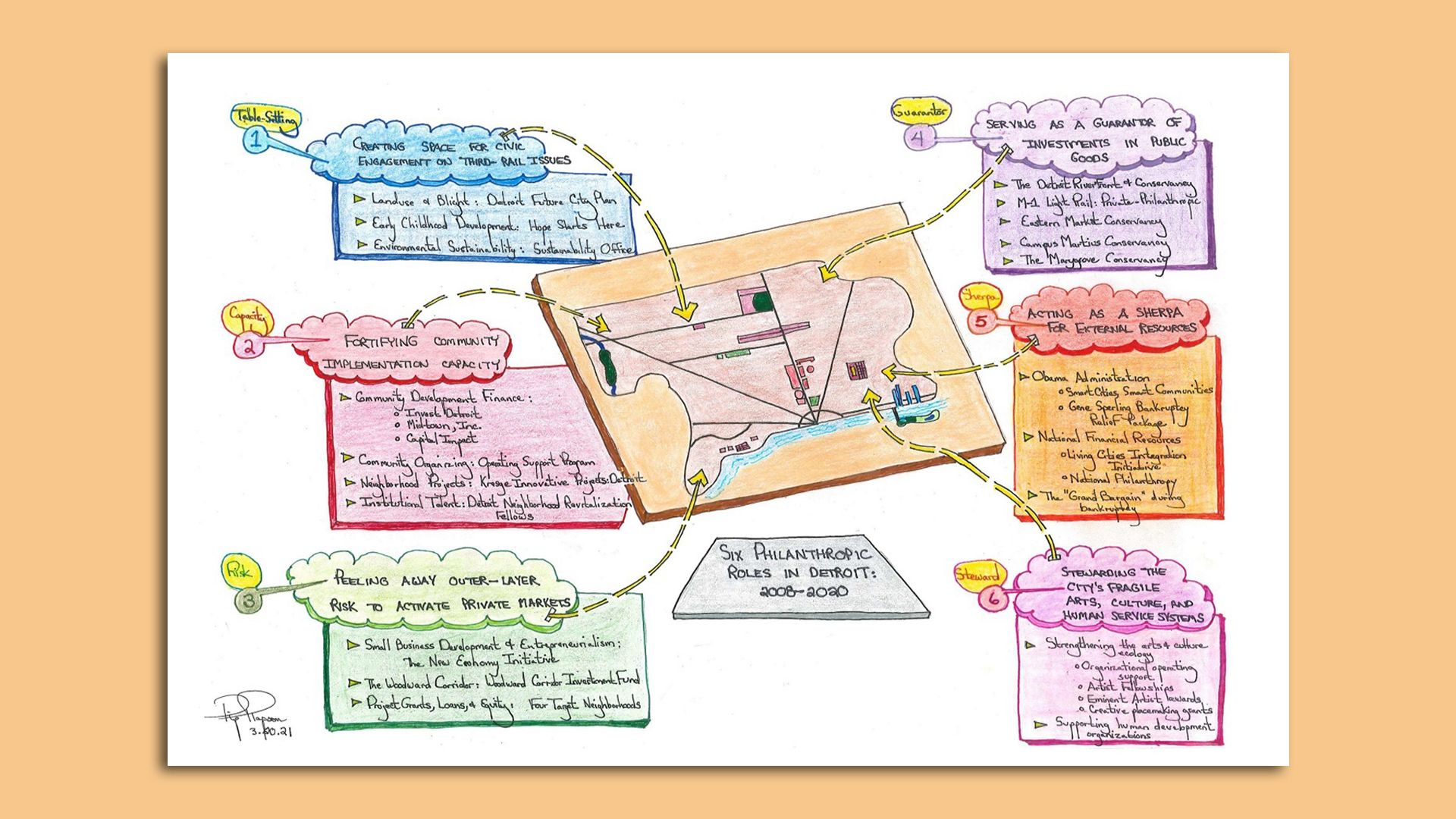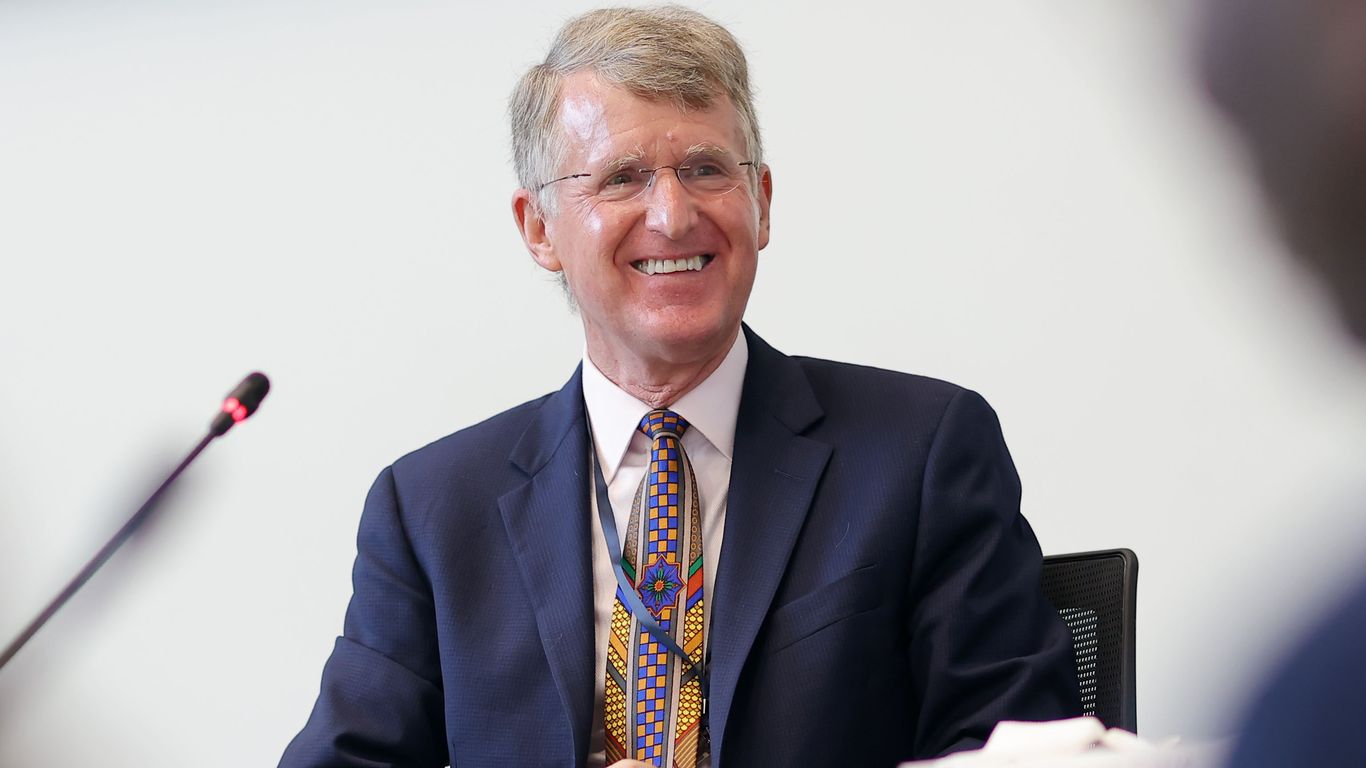Rip Rapson. Photo: Courtesy of the Kresge Foundation
The Kresge Foundation has an instrumental influence in Detroit, from committing $100 million in 2014 to help usher the city out of bankruptcy to funding community projects. Kresge gave $181 million in national grants in 2021, the most recent year available, including $39 million in Detroit.
Why it matters: The Troy-based foundation is now considering how it can help Detroit implement its historic cache of federal COVID-19 recovery funding.
- Rip Rapson, Kresge’s longtime president and CEO, spoke with Axios about how philanthropy can assist these efforts. The conversation has been edited for length and clarity.
Axios: How have Kresge’s interactions with the city changed over the years?
Rapson: “For so many years, so much was just trying to stabilize the tax base (post-bankruptcy), create support that was almost the fundamentals of good community governance.”
- “What Kresge is trying to do is work on multiple building blocks of neighborhood health and stability. What we’ve tried to do is understand how economic development, housing, open space and small business development can combine to create neighborhoods that are stable and vibrant.”

Axios: Has Kresge been involved in guiding Detroit’s use of its American Rescue Plan Act (ARPA) dollars?
Rapson: “It’s such an interesting case. (How Mayor Mike Duggan identified funding priorities) I think in some ways has become a model for other mayors. That’s step one.”
- “But landing $400 million in communities is something that’s going to require really sophisticated networks of implementation. Whether you’re thinking about community-based development or open space or building out the Joe Louis Greenway … you need nonprofit infrastructure to move this stuff.”
- “Every time you build something, the city of Detroit’s not building it right? It’s going to be a (community development organization) or a for-profit developer … So one of the things Kresge has done is to say: This is a classic capacity-building opportunity. We have to make sure organizations connected to communities actually have the capacity to absorb these dollars and implement them properly.”
- “We’ve got to figure out how to move these dollars through community-based organizations (who are experts in their neighborhoods). The problem is with any (government) money there’s … restrictions, and so often community-based organizations simply can’t do it. So the system breaks down unless you can go to a Kresge or (a financial institution).”
- “I think it’s one of the unwritten stories of all this, that hitting the ground is really complicated.”
Axios: Have there been certain areas of Detroit’s ARPA spending that you’ve been involved with?
Rapson: “Not yet. But we are actively engaged in conversations with the city to figure out how we could be helpful. I think it’s likely to come in the realm of community health.”
- “They’ve allocated about $15 million to block clubs, I can only imagine they want to couple that up with our support. (Plus) neighborhood beautification arts projects and small business support.”
Axios: I’m sure you’ve been asked this question a billion times. Kresge has been headquartered in Troy for a long time. Has there been any consideration of moving to Detroit?
Rapson: “It’s actually surprising we don’t get asked that often, because it’s such a legitimate question. A number of years ago we said we need to have a presence in Detroit, so we did invest on Woodward (in Midtown) … we have 20-25 people down there.”
- “The bigger question, though, is whether over the long term, Kresge’s mission is compatible with our remaining here (in Troy), and I’m not sure the answer to that is yes. I think the answer may well be no. This is a time, particularly when we come upon our centennial (anniversary of our founding) next year, where that is a question that we need to put front and center. So I wouldn’t rule out the possibility those will be active conversations.”
Credit:Source link



